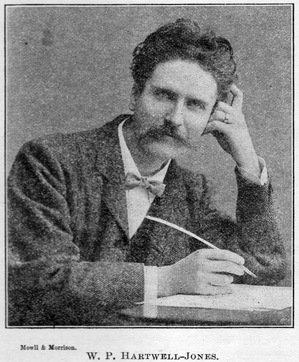 Mr. W. P. Hartwell-Jones, whose name has become familiar to the readers of The Etude, whose latest song appears in this number, is a well-known organist, vocalist, and composer in England, and was born twenty-nine years ago in the small, but antiquated and historical, Welsh town of Flint. At an early stage he evinced a decided predilection for the profession which he subsequently adopted, and, acting under competent advice, his parents placed the boy under the care of that brilliant Liverpool musician, W. H. Jude, whose achievements as a composer of bass and baritone songs have long been universally admired. The rapid progress made by the young pupil made him at once an object of special interest to his master, who fostered the growing talent with the most assiduous and painstaking attention.
Mr. W. P. Hartwell-Jones, whose name has become familiar to the readers of The Etude, whose latest song appears in this number, is a well-known organist, vocalist, and composer in England, and was born twenty-nine years ago in the small, but antiquated and historical, Welsh town of Flint. At an early stage he evinced a decided predilection for the profession which he subsequently adopted, and, acting under competent advice, his parents placed the boy under the care of that brilliant Liverpool musician, W. H. Jude, whose achievements as a composer of bass and baritone songs have long been universally admired. The rapid progress made by the young pupil made him at once an object of special interest to his master, who fostered the growing talent with the most assiduous and painstaking attention.
It was not long ere young Hartwell-Jones, at the age of about 11 (having been then studying music for about eighteen months), was intrusted with the assistant organistship of the famous Hugh Stowell Brown Church in Myrtle Street, at which edifice Mr. Jude presided at the organ.
Soon after this he also became assistant organist of the Blue Coat Hospital. At both of these places he subsequently became the organist, and the latter post he still fills, in conjunction with that of the Welsh Cathedral in the Prince’s Boulevard, Liverpool.
Hartwell-Jones, at an early period, began the composition of music, but it was not until he was well in his teens that anything from his pen came under public notice. His first popular “hit” was, no doubt, “The Heavenly Song,” which found its way, not only into the homes of England, Ireland, Scotland, and Wales, but into the far-reaching lands across the seas. This success was followed by a still greater one, that of another song, “A Dream of Paradise,” following again upon which came “The Golden Pathway,” “Two Cities,” “The Land of Home,” “The Purple Heather,” “The Perfect Life,” etc.
Not only in the rôle of composer has this young musician won the laurels of fame, but as an organist, an adjudicator, and as a vocalist. He has officiated at the inaugurations of numerous church and concert-hall organs, judged at several competitive gatherings and Eisteddfods, and sung (invariably to his own accompaniment) at many concerts. He was a prominent and leading light in the preparations that were made for the holding of the Royal Welsh National Eisteddfod of 1900 at Liverpool, and was honored by the selection of one of his latest songs (“A Voice that Bids me Come”) as the chief contralto test.
Many of our readers will learn, perhaps with some surprise, that the subject of our sketch writes many of his songs under the non-de-plume of “Hamilton Gray”: a name well known to singers.



